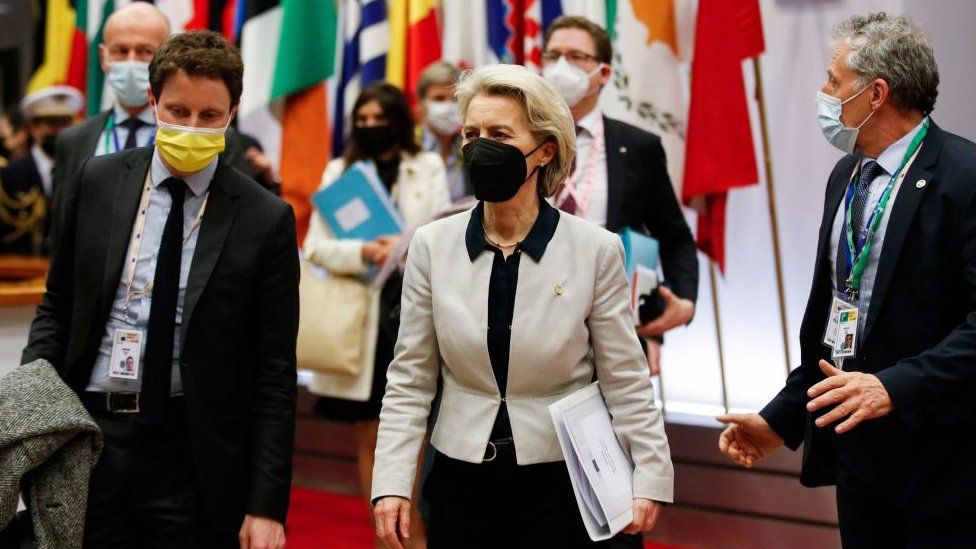
02/03/2022
EU Insight, 25 February 2022
Brussels, 25 February 2022
EU LEADERS AGREE ON FURTHER SANCTIONS AS RUSSIA INVADES UKRAINE
In the evening of 21st February, Russian President Vladimir Putin announced recognition of the Donetsk and Luhansk regions as independent and few days later invaded Ukraine under the pretext of protecting citizens of those regions. In response, the EU, US, G7 and NATO published several statements condemning Russia’s actions and calling for immediate de-escalation. During a special meeting of the European Council, leaders agreed on a package of sanctions against entities and individuals in Russia and Belarus. Measures cover the financial sector, the energy and transport sectors, export control, export financing and visa policy. Further sanctions could follow in the coming days depending on how the situation evolves.
COMMISSION IDENTIFIES PERSISTENT EU’S STRATEGIC DEPENDENCIES
The Commission presented the second edition of its in-depth analysis of Europe’s strategic dependencies. By examining the five areas where Europe faces strategic dependencies on other countries (i.e. rare earths and magnesium, chemicals, solar panels, cybersecurity and IT software) the report identified dependencies on rare earths, magnesium and PV panels from China, as well as EU’s weaknesses compared to its competitors for cybersecurity and IT software. Dependencies were also found for chemicals which have a critical importance for the industrial ecosystems. Nonetheless, the Commission found that progress has been achieved, through existing industrial alliances, adoption of regulatory proposals on batteries and semiconductors, as new international partnerships.
PROPOSAL TO MAKE DATA ACCESS AND (RE)USE FAIRER
The Commission proposed new rules clarifying who can use and access data, and on what terms, generated in the EU across all economic sectors. The Data Act aims at ensuring fairness in the digital environment, and at stimulating a competitive data market as well as opportunities for data-driven innovation. Commissioner Thierry Breton defined the proposal as “an important step in unlocking a wealth of industrial data in Europe, benefitting businesses, consumers, public services and society as a whole”. The Data Act is the last part of the Commission’s data strategy, which aims at guiding the EU’s digital transformation by 2030. It will now go to the Council and Parliament for decision.
COUNCIL ADOPTS POSITION ON CORPORATE SUSTAINABILITY REPORTING DIRECTIVE
Member States reached an agreement on the European Commission’s proposal for a corporate sustainability reporting Directive (CSRD). The proposal revises the non-financial reporting Directive (NFRD) from 2014 and aims at ensuring the robustness of companies’ commitments by increasing a company’s accountability, preventing divergent national standards and by easing the transition to a sustainable economy. The Council’s general approach amends the scope of the Commission’s proposal to ensuring that reporting requirements are not too burdensome for listed SMEs as well as providing them with sufficient time to adapt to the new rules. Interinstitutional negotiations with the Parliament are expected to begin in spring 2022.
200 EUROPEAN CITIZENS GATHERING IN DUBLIN TO DISCUSS THE FUTURE OF EUROPE
The Conference on the Future of Europe travels to Dublin this weekend to debate and deliver its final recommendations from one of the European Citizens’ Panels. The panel focuses on ‘a stronger economy, social justice and jobs/education, culture, youth and sport/digital transformation’ and has divided its interest into five workstreams: Working in Europe, An Economy for the Future, A Just Society, Learning in Europe, and An Ethical and Safe Digital Transformation. This gathering represents the last meeting of three rounds of discussions and debates on these recommendations and will be followed with a debate on the final recommendations at the Conference Plenary meeting on 11-12 March.
COMING UP NEXT WEEK
- 28 February – 1 March: Informal meeting of ministers responsible for cohesion policy. On the agenda: Cohesion policy in the context of the recovery of the European economies, 8th report on economic, social and territorial cohesion
- 1 March: European Parliament Plenary session. On the agenda: Debate on Russian aggression against Ukraine.
- 2 March: College of Commissioners meeting. On the agenda: Joint European Action for more affordable, secure and sustainable energy, 2022 Fiscal policy guidance, A future-proof European Growth Model.
- 3-4 March: Informal meeting of the General Affairs Council.
- 3-4 March: Justice and Home Affairs Council. On the agenda: Schengen, migration and asylum management, e-evidence proposal, fundamental rights.
- 6-7 March: Informal meeting of development ministers. On the agenda: Challenges of cooperation in the field of development in a context of heightened competition in the priority regions of the EU and post-COVID-19 recovery.
Karl Isaksson, Managing Partner Brussels, Kreab
____________________________________________________________________
Kreab • Tel: +32 2 737 6900 • karl.isaksson@kreab.com • www.kreab.com/brussels • Twitter: @KreabEU.
